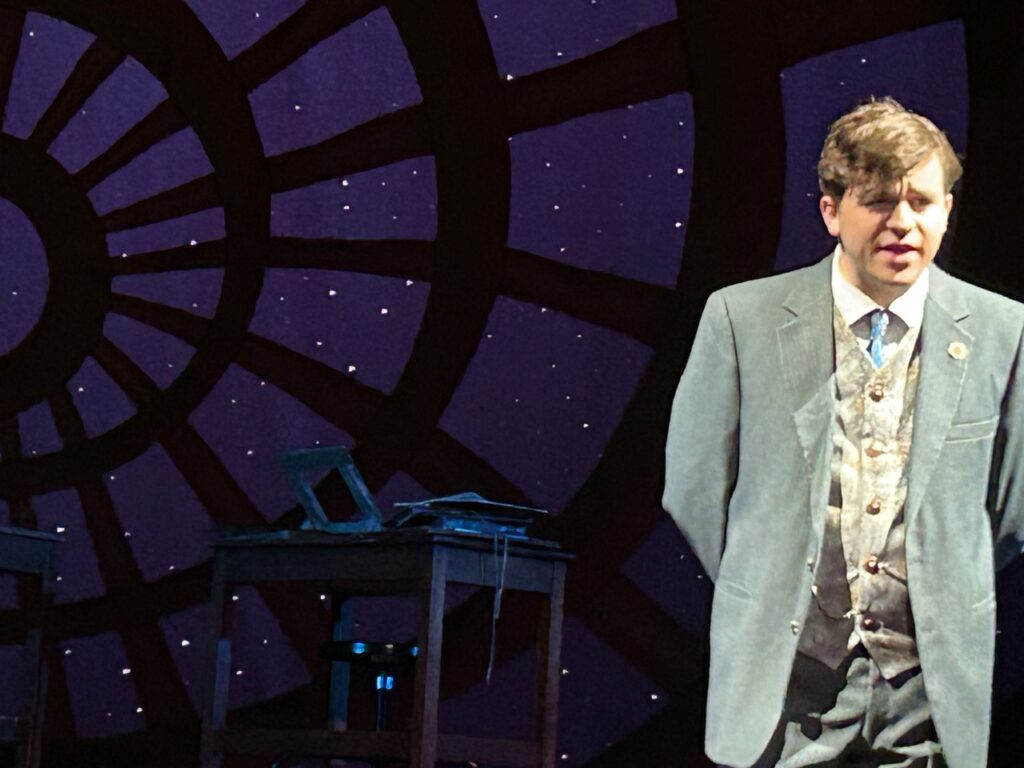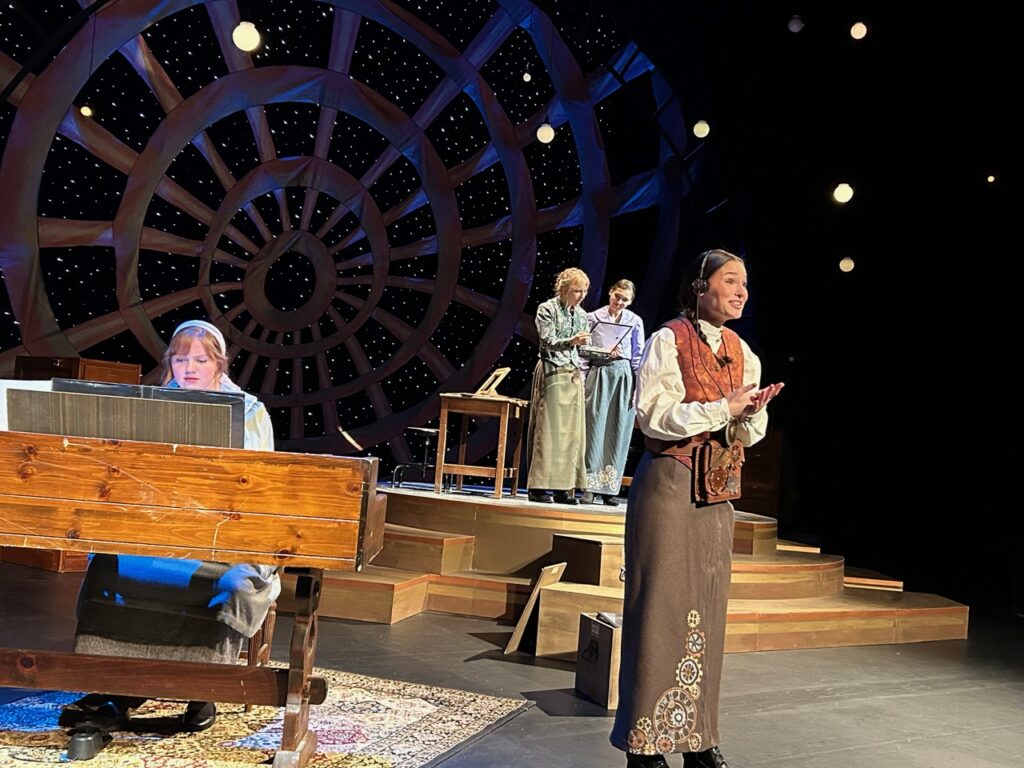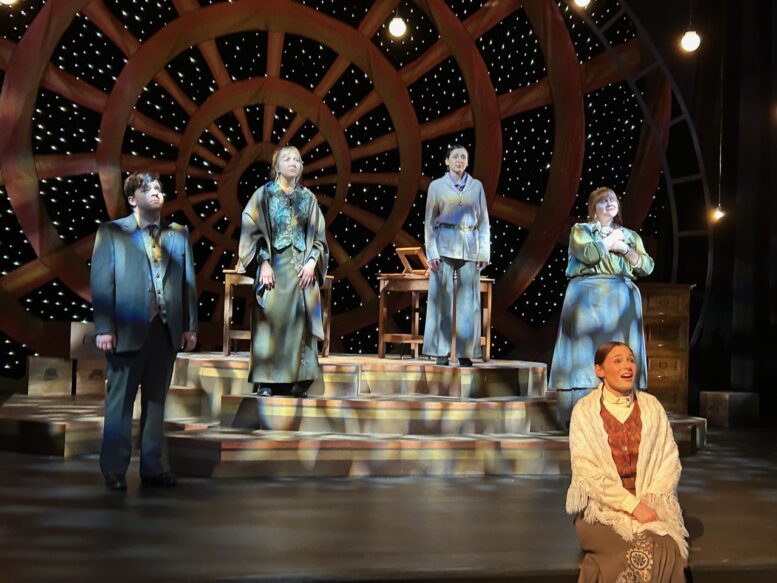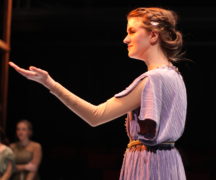By DAVID DUPONT
BG Independent News
We never get to see astronomer Dr. Pickering even though he made a critical discovery. He realized that women were far better than male graduate students in doing the meticulous calculations needed for astronomical observations.
These women were considered computers and dismissively referred to as “Pickering’s harem.”
When one promising “computer” shows up at the Harvard observatory to work, he has more “pressing” matters to attend to. As far as we know he never met Henrietta Leavitt, a computer whose calculations would change the field of astronomy, and lead to pushing our observations to the edge of the cosmos.
While this is a time when the sky is the limit, the glass ceiling of the observatory is unbroken.

In “Silent Sky”Lauren Gunderson dramatizes the struggles and triumphs of Leavitt. The play, directed by Madison Ellis with assistance from Sarah Nesselroade Hopson, opens at the Donnell Theatre at BGSU Thursday, Nov. 21 and continues Friday and Saturday, at 8 p.m. with matinees Saturday and Sunday at 2 p.m. Tickets are available at BGSU.edu/the-arts/tickets or by card only at the box office one hour before each performance.
When we meet her, Leavitt (Claire Oliver) is staring up at the sky contemplating earth’s place in the universe. At the time the question was whether there was anything beyond the Milky Way.

Her sister Margaret (Liv Lutz) comes out to encourage her to attend church. Their father is the minister, and Margaret is the organist. But Leavitt’s church is the sky.
Then she announces to Margaret that she has an offer to work at Harvard and will leave Wisconsin and their family to go to Cambridge. This is her chance to work as an astronomer.
Those hopes are tempered, though not dashed, on her arrival to learn she would not be working directly with Dr. Pickering. Instead her go-between will be his dutiful toady Peter Shaw (Ean McIntosh), who we learn would rather perform in musicals, but has achieved his place in the university through his father’s connections.
Women are not allowed to use the telescopes, instead they make their calculations based on glass plate images.
Henrietta also meets her co-workers Annie Cannon (Mariana Jacoia) and Williamina Fleming (Finleigh Klein), who though highly educated ended up as Pickering’s housekeeper when her husband abandoned her.
Both women are forces in their own right. Fleming welcomes Leavitt to “the harem,” while Cannon, an early feminist, is more suspect of her new colleague. Both have forceful intellects, and they come to recognize and appreciate Leavitt’s brilliance.
They band together against the male hierarchy, which is as faceless as it is unwelcoming, except for Shaw.
Shaw seems more out of place than the women, deeply uncertain of his own talents, and in his way a lesser victim of the patriarchy.
The play, which is based of the lives of these real people, is concerned with the intersection of human relationships and a passion for scientific knowledge.

Leavitt and Shaw develop a romantic relationship, but she sets it aside for work, and then the responsibilities of family.
Margaret is frustrated that her sister does not respond to her letters, even when their father sends her a book as a gift. Margaret is the daughter, and wife and mother, trapped at home with the responsibilities for her father and her own family. Yet she has her own ambitions. She wishes to compose music, and not just more hymns like those she plays in church.

The small cast bonds well. Their characters are large enough to project the realm of scientific exploration.
The play is accompanied by a delicate, but evocative piano score.
The set designed by Kelly Mangan is striking with the glass roof of the observatory serving as the backdrop. This is complemented by Baxter Chambers’ lighting design. The stars are ever present. Costume designer Margaret McCubbin incorporates these celestial elements into the dress of the three human computers.
As the impact of Henrietta’s work becomes evident in the final moments of the play, the audience understands how this human computer’s work has shined a light on our understanding of the universe, and our place in it.





